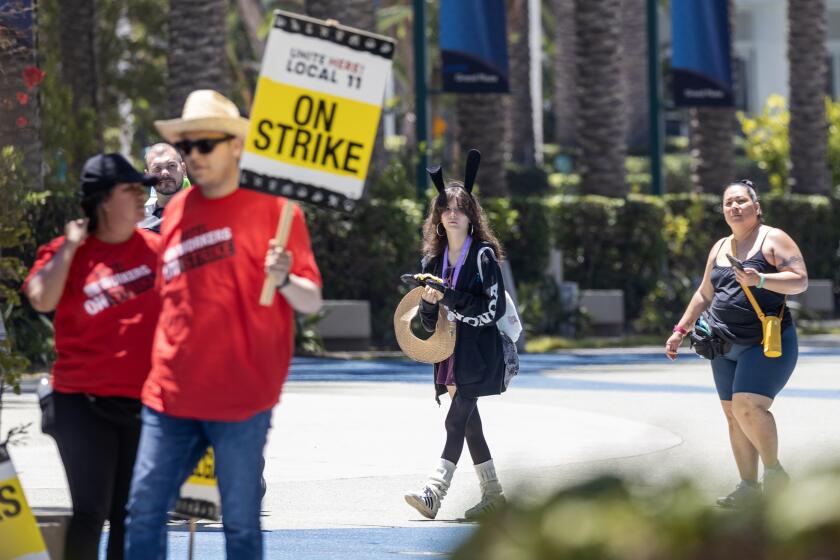Disneyland workers could get a pay hike to nearly $20 an hour after living-wage win

A California appellate court ruled that Disneyland has illegally evaded a living-wage law passed by Anaheim voters in 2018 that could boost pay for Disneyland Resort workers to nearly $20 an hour.
The ordinance, known as Measure L, applies a minimum wage to Anaheim resort companies that have tax rebate agreements with the city.
In response to a class-action lawsuit representing 25,000 workers, attorneys for Walt Disney Co. argued that it received no such city subsidies in Anaheim and that the law therefore didn’t apply.
But a three-judge panel from California’s 4th District Court of Appeal disagreed, citing a provision in a 1996 Disney expansion deal passed by Anaheim in which the city agreed to repay the company if it had to cover bond payments.
“We are pleased the court focused on the economic reality of Disney’s agreements with Anaheim and concluded that Disney is obligated to comply with the living wage law,” said Sarah Grossman-Swenson, an attorney representing the workers. “The court’s decision will have a real impact on thousands of Disney employees who work so hard but struggle to provide for their families.”
Under the minimum-wage law, Disney theme park employees could be paid nearly $20 an hour.
“It’s a huge legal victory for not just workers at the resort and at the park but the voters of the city as well because they’re the ones who passed this measure,” Workers’ United Local 50 Vice President Chris Duarte said. Local 50 represents about 8,500 Disneyland food and beverage staff.
The ruling was a “good surprise” for Duarte, who said that the union is still trying to grasp the full effect amid bargaining with Disney as their contract expires Sept. 1. Park performers, represented by the American Guild of Variety Artists, are also in contract negotiations. Next year, the contract expires for workers represented by the Masters Services Council, a coalition of Teamsters Local 495, Service Employees International Union-United Service Workers West, United Food and Commercial Workers Local 324 and Bakery, Confectionery, Tobacco Workers and Grain Millers’ International Union Local 85.
“There’s no way to ignore it,” Duarte said.
Many of the workers are employed by Disney. Others work for contractors such as Sodexo and SodexoMagic, which operate restaurants and coffee shops in the resort.
The ‘cabal’ steered policy, received contracts from the city and scripted remarks by Anaheim’s mayor, a Times investigation found.
Disneyland spokesperson Suzi Brown said the company is “reviewing the opinion and considering our options.”
Anaheim city spokesperson Mike Lyster said: “We respectfully question the interpretation but need to analyze the decision in the days ahead to determine what it means.”
The Anaheim City Council has given generous tax breaks to the largest employer in Orange County in the past.
In 2015, council members approved a policy to reimburse Disney for any future admissions tax for up to 45 years in exchange for a $1-billion expansion of the theme park.
The next year, Disney received a $267-million tax break for a planned luxury hotel.
A day after extending his contract as Walt Disney Co.’s CEO, Iger said he is open to spinning off ABC Television and taking on a partner for ESPN.
But in the midst of the heated living-wage campaign, Disney asked the Anaheim City Council to tear up the two agreements.
The move shocked some political observers, who saw it as a calculated way to evade the measure if passed by Anaheim voters.
Without the agreements on the books, the city exempted Disney from the law in 2019 on the grounds that its triggers didn’t apply to the company.
An Orange County Superior Court judge agreed in a summary judgment favoring Disney two years later.
“Whether the city of Anaheim ‘subsidized’ the Disney defendants in a colloquial sense is not an issue,” Judge William D. Claster wrote in a tentative ruling in 2021.
Workers at four more hotels, including two near Disneyland, walked off the job Tuesday, joining a second wave of strikes to hit Southern California’s hospitality sector this summer.
The appellate court overturned Claster’s ruling, which hinged on the 1996 expansion deal that paved the way for Disney to build California Adventure, Downtown Disney and the Grand Californian Hotel while Anaheim modernized its resort area with $510 million in bond proceeds.
Disney has never had to cover any bond payments, even when the COVID-19 pandemic closed Disneyland for 13 months and tourism in the city plummeted.
Disney could appeal the appellate ruling to the California Supreme Court, but attorneys representing its workers hope that the legal fight is over.
“We know from talking to several of the named plaintiffs in the litigation, that they had at least a shortfall of several dollars per hour for some time,” Grossman-Swenson said. “We urge Disney to do the right thing and start complying with the law.”
In a February 2018 survey by Occidental College and the Los Angeles-based Economic Roundtable, Disneyland employees cited high instances of homelessness, low wages and food insecurity. Disneyland representatives called the survey, which was paid for by labor unions, “inaccurate and unscientific.”
Virginia Aguirre, who has worked at the Starbucks on Disneyland’s Main Street for 10 years, once lived only three miles from the theme park but now commutes 90 miles to work from her daughter’s San Bernardino County home. Aguirre, 59, cried as she described how she faced eviction because she couldn’t pay the one-bedroom apartment’s rent, which had slowly doubled to $1,600 a month.
“You put on that smile, and you will make magic for these thousands of people and carry on the responsibilities that our managers expect us to carry on, but it’s rough,” Aguirre said.
Roberto Villaseñor, who also works in food and beverage service at Disneyland, said he often must choose between gas to commute to work and his monthly asthma medication as expenses for both became more challenging.
Disney constantly boosts its customer-service standards, Villaseñor said. “But for the expectations that they increase, they’re not increasing the wages,” he said.
Aguirre said she hopes Thursday’s appellate court ruling means that Disney will fulfill its responsibilities under the 2018 voter-approved initiative.
“When we get our back pay, God willing, that lump sum will help me relocate and come back, take my stuff out of storage and live modestly,” she said. “Pay us a livable wage so that our smile isn’t fake.”
More to Read
Inside the business of entertainment
The Wide Shot brings you news, analysis and insights on everything from streaming wars to production — and what it all means for the future.
You may occasionally receive promotional content from the Los Angeles Times.















